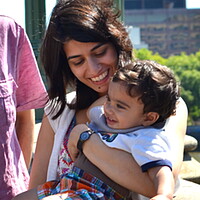Back in America from Norway, expat mom measures her change
I love how innately friendly Americans are. Our ability to make a complete stranger feel like a long lost pal is our most well-known trait. Ask a foreigner to describe the average American and the first thing they’ll say is “friendly".
The first American I encountered as I left Scandinavia a few weeks back confirmed this, although he also made me realize how much I’ve changed. As I settled in on the plane, preparing for the 8 1/2-hour flight, the man across the aisle addressed me. Over the din of the airplane engine I wasn’t sure what he said but my immediate reaction was to become defensive: “Don’t worry, my son is really well-behaved on airplanes.”
I hadn’t been in Europe long before I realized that striking up a conversation with a complete stranger is uncommon and typically done when asking someone to get out of your way or to tell your child to, well, stop behaving like a child. That’s why I was surprised when the man continued the conversation, but as soon as I heard his American accent I softened up – and rightly so. It turns out that Dave (for, of course, proper introductions followed) was simply commenting that since my husband, son, and I had four empty seats all to ourselves, perhaps we might get some sleep. How kind of him to say so.
By the time the stewardess was serving dinner I had gotten my groove back. I learned that Dave was from Connecticut where he has a wife and three kids, and that he had been traveling overseas for work. I shared a bit about myself and by the time we were in the immigration line at Dulles Airport, I had talked him into reading a Benjamin Franklin biography.
Our journey home was smooth. As the plane descended and the pilot made his final announcements in Norwegian (before switching to English), I breathed a little sigh of relief that for the next few weeks I would understand all of the words I heard around me.
My first few days home were a blur. Jet lag takes longer to overcome when you have a toddler, so I was awake at odd hours and hungry at all the wrong times. But I didn’t care. My brother-in-law had stocked up on my favorite American comfort foods and, even though on the first night my son woke me up at 3 a.m. for breakfast, I couldn’t have been happier watching him hungrily stuff Eggo Waffles in his mouth.
The next day a quick trip to the grocery store made me realize exactly how much my day-to-day habits have changed. Sitting in a car felt strange and boring. We don’t have a car in Norway, nor do we need one. Oslo, like most European cities, is built so that you can walk or hop on a train to get just about everywhere.
Walking up and down the grocery store aisles I suddenly felt a pang of jealousy of how much is available in the US, while I am sitting up at the North Pole fantasizing about ready-made rice pudding pots and buying pancake mix at a regular grocery store (rather than at an expensive specialty shop in Oslo). The sheer volume and variety was, for the very first time, overwhelming. I spent 10 minutes examining the yogurt shelf only to come home without any because I couldn’t figure out which one I wanted.
A simple exchange at the cash register suddenly felt complicated. In Norway, sales tax is built into the advertised price of an item, allowing you to have exact change ready to hand over. But in the US the measly 6 or 7 percent tax is factored in at the register, which put extra pressure on my already pathetic math skills as I count pennies and nickles, which are inevitably mixed in with various European currencies no matter how hard I try to keep them separate. I keep getting flustered and just hand the cashier a large bill and then end up with more useless change than I started with.
Even the reason why I am determined to use change is European. Coins come in large denominations there which means a palmful of coppers can add up to the price of a meal.
In a strange way I’ve become an observer of American life. When I visit I notice trivial, humdrum things that I took for granted and wonder when they will once again be part of my routine. I find that with each trip home my yearning to move back to America is slowly increasing while my sense for adventure is gradually lessening. (Extra emphasis on the words “slowly” and “gradually.”)
I think my burgeoning desire to be back in the US largely has to do with a need for familiarity. When I moved from England to Norway I went further from America geographically and culturally. Living in a consumerist society where TV ads include commercials for antidepressants and eating fruits and vegetables that have been pumped with so many chemicals that they are three times the size than they’re supposed to be is what I consider “normal." This version of normal is what I have sorely missed and plan to enjoy while I’m on vacation.
The Christian Science Monitor has assembled a diverse group of the best family and parenting bloggers out there. Our contributing and guest bloggers are not employed or directed by the Monitor, and the views expressed are the bloggers' own, as is responsibility for the content of their blogs. Saleha Mohsin blogs at Edge of the Arctic.






